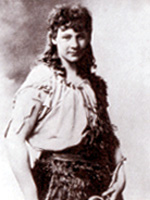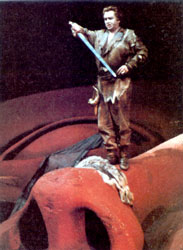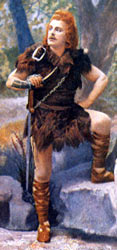|
 That night, Alberich keeps vigil near Fafner's cave, brooding over his lost treasure, determined to regain the Ring. When the Wanderer approaches, bathed in eerie light, the Nibelung at once recognizes him as Wotan. The god assures him that he no longer cares about the Ring - he is now only an observer of destiny. He adds that it is Mime whom Alberich should fear, for Mime wants the gold and brings a valiant young hero to slay Fafner. The Nibelung is perplexed that his enemy seems to be helping him. Wotan and Alberich rouse the sleeping Fafner to warn him of approaching danger, urging him to surrender the Ring, but Fafner only mumbles he will devour any attacker. God and Nibelung disappear in the shadows.
That night, Alberich keeps vigil near Fafner's cave, brooding over his lost treasure, determined to regain the Ring. When the Wanderer approaches, bathed in eerie light, the Nibelung at once recognizes him as Wotan. The god assures him that he no longer cares about the Ring - he is now only an observer of destiny. He adds that it is Mime whom Alberich should fear, for Mime wants the gold and brings a valiant young hero to slay Fafner. The Nibelung is perplexed that his enemy seems to be helping him. Wotan and Alberich rouse the sleeping Fafner to warn him of approaching danger, urging him to surrender the Ring, but Fafner only mumbles he will devour any attacker. God and Nibelung disappear in the shadows.
As dawn breaks, sunlight penetrates the dense foliage of the forest. Mime enters with Siegfried, showing him Fafner's lair. Dismissed by the youth, the treacherous gnome hobbles off. Siegfried stretches on the ground under a lime tree to rest, enchanted by the murmur of the forest, yearning for the mother he never knew. High in the branches over his head, a Forest Bird warbles a song he wishes he could understand. Cutting a reed and blowing on it, Siegfried tries to imitate the bird.
 Then he raises his silver hunting horn to his lips, inadvertently awakening Fafner, who rumbles forth from his den. During the ensuing struggle, Siegfried plunges his sword into the monster's heart. Dying, Fafner warns that whoever put Siegfried up to this deed is plotting his death as well. When Siegfried draws Nothung from the beast, his fingers are burned by blood, so he touches them to his lips. The taste of the dragon's blood enables him to understand the language of the Forest Bird, who tells him of the Nibelung hoard, the Tarnhelm and all-powerful Ring. As Siegfried disappears into the cave to inspect the treasure, Mime slinks back, only to be confronted by Alberich. The brothers quarrel over the spoils, withdrawing when Siegfried reappears, carrying proof of his victory - the Tarnhelm, which he fastens to his belt, and the Ring, which he places on his hand. Now the Forest Bird warns Siegfried about Mime, who soon creeps forward, bearing a poisoned drink. Reading the dwarf's true thoughts, the youth loses patience with the Nibelung and kills him, as Alberich's laughter echoes in the distance. While Siegfried rests, lamenting his solitude, the bird tells of a maiden who sleeps on a fire-encircled rock - Brünnhilde, a bride who can be won only by a hero who knows no fear. The youth runs through the forest toward the mountain where she sleeps.
Then he raises his silver hunting horn to his lips, inadvertently awakening Fafner, who rumbles forth from his den. During the ensuing struggle, Siegfried plunges his sword into the monster's heart. Dying, Fafner warns that whoever put Siegfried up to this deed is plotting his death as well. When Siegfried draws Nothung from the beast, his fingers are burned by blood, so he touches them to his lips. The taste of the dragon's blood enables him to understand the language of the Forest Bird, who tells him of the Nibelung hoard, the Tarnhelm and all-powerful Ring. As Siegfried disappears into the cave to inspect the treasure, Mime slinks back, only to be confronted by Alberich. The brothers quarrel over the spoils, withdrawing when Siegfried reappears, carrying proof of his victory - the Tarnhelm, which he fastens to his belt, and the Ring, which he places on his hand. Now the Forest Bird warns Siegfried about Mime, who soon creeps forward, bearing a poisoned drink. Reading the dwarf's true thoughts, the youth loses patience with the Nibelung and kills him, as Alberich's laughter echoes in the distance. While Siegfried rests, lamenting his solitude, the bird tells of a maiden who sleeps on a fire-encircled rock - Brünnhilde, a bride who can be won only by a hero who knows no fear. The youth runs through the forest toward the mountain where she sleeps.
By night, as thunder and lightning threaten a wild mountain gorge, the Wanderer summons Erda from sleep. Concealing his identity, he seeks knowledge of the future. Erda evades the questions, and the god, resigning himself to Valhalla's doom, bequeaths the world to the redemptive power of Brünnhilde's love. When Siegfried ventures into the gorge, the Wanderer encounters his grandson, inquiring with humor about his exploits and the sword he wears. Siegfried responds arrogantly, angering the god, who tries to block his path. Drawing Nothung, the youth splinters the Wanderer's spear with a single stroke. Realizing his power has ended, the deity retrieves the broken pieces, then vanishes as Siegfried scales the mountain.
 Dawn breaks on the rocky height where Brünnhilde rests. Reaching the summit, Siegfried discovers an armed, sleeping figure, which he assumes to be a man. When he removes the Valkyrie's shield, helmet and breastplate, however, he finds instead the first woman he has ever seen. At last sensing fear, he invokes the spirit of his mother, finally summoning the courage to kiss the maiden's lips. Brünnhilde, roused from her long slumber, slowly realizes she is not dreaming, that Siegfried has come. She hails the sunlight and her return to life. When Siegfried tries to embrace her, she starts in alarm, protesting that earthly passion would destroy her immortality. But she is mortal, no longer a Valkyrie, and womanly ardor soon replaces shame and fear. Throwing herself into Siegfried's arms, she bids farewell to memories of Valhalla, abandoning herself to human love, exulting even in thoughts of death.
Dawn breaks on the rocky height where Brünnhilde rests. Reaching the summit, Siegfried discovers an armed, sleeping figure, which he assumes to be a man. When he removes the Valkyrie's shield, helmet and breastplate, however, he finds instead the first woman he has ever seen. At last sensing fear, he invokes the spirit of his mother, finally summoning the courage to kiss the maiden's lips. Brünnhilde, roused from her long slumber, slowly realizes she is not dreaming, that Siegfried has come. She hails the sunlight and her return to life. When Siegfried tries to embrace her, she starts in alarm, protesting that earthly passion would destroy her immortality. But she is mortal, no longer a Valkyrie, and womanly ardor soon replaces shame and fear. Throwing herself into Siegfried's arms, she bids farewell to memories of Valhalla, abandoning herself to human love, exulting even in thoughts of death.


|